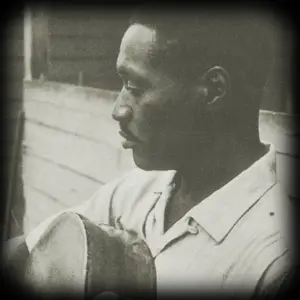BABY TATE
 Piedmont Blues is not as dark and brooding as its Delta cousin, often featuring delightful ragtime melodies and delicate fingerpicking and tricksy embelishments. There was an upsurge in interest in this style during the Folk/Blues revival of the 60s, with players like Rev. Gary Davis and Josh White filling clubs in New York, but back in the Carolinas, there were other original Bluesmen whose work was coming to light. Buddy Moss had been spoken of as a worthy successor to Blind Blake, and another spectacular guitarist to be discovered there in the early 60s was Baby Tate.
Piedmont Blues is not as dark and brooding as its Delta cousin, often featuring delightful ragtime melodies and delicate fingerpicking and tricksy embelishments. There was an upsurge in interest in this style during the Folk/Blues revival of the 60s, with players like Rev. Gary Davis and Josh White filling clubs in New York, but back in the Carolinas, there were other original Bluesmen whose work was coming to light. Buddy Moss had been spoken of as a worthy successor to Blind Blake, and another spectacular guitarist to be discovered there in the early 60s was Baby Tate.
Baby’s fine ‘Dupree Blues’
Baby had an ‘interesting’ War. During training at Fort Hood in Texas, he played with Lightnin’ Hopkins before being shipped off to see action in North Africa and the invasion of Italy. He was seen playing in pubs along the English south coast as his unit prepared for D-Day, where he was wounded in Normandy. He recovered back at Fort McKay near Boston, just in time to ship out for the Battle of the Bulge, the Nazis vicious ‘last stand’ fight in the Ardenne Forest, where Baby got shot again. He must have been glad to get back to Greenville to play the Blues and build some walls! He took his guitar on the road too, as he made some recordings for Dave Kapp in Atlanta in the early 50s. In 1954 he relocated to Spartanburg SC where he made the acquaintance of Pink Anderson, who was making a living following Dr. Kerr’s Medicine Show along with Peg Leg Sam. Pink and Baby got on very well, often playing together and sharing material, until Pink suffered a stroke in the late 60s. Baby’s recording career got started in 1962, when Sam Charters came to town intending to record Pink, but discovered another big talent there too. ‘See What You Done Done’ was Baby’s only major release, but he also featured in Sam’s documentary film ‘The Blues’ the following year.
Baby Tate Discography
This hidden gem has a dozen tracks of the finest Piedmont fingerpicking, with complex ragtime polyrhythms, and Baby’s superb downhome vocals and songwriting too.
